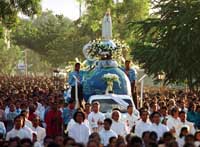|
New nation on path to greatness NEW YORK- When East Timor was fighting for independence in the 1980s, very few in the United States had ever heard of the former Portuguese colony which was annexed by Indonesia in 1975.
Jose Ramos Horta,
who represented the Freitilin guerrilla movement in New York's asphalt
jungle, lived in a tiny apartment just above a supermarket in the
UN neighbourhood. East Timor and eskimo may sound strikingly similar to Americans, but Horta and eskimos are worlds apart- physically and geograpically. The joke was rather appropriate, particularly in a country where only 5 percent of the 282 million people possess passports for overseas travel. If an average American thinks that Sinai is the plural of sinus, why shouldn't the people of East Timor be mistaken for eskimos?. During his election campaign, even President George W. Bush mistakenly kept referring to the Timorese as Timorians - even as he called the Greeks Grecians. But since then, he has come a long way mastering jaw-breaking names such as Kyrgyzstan, Kazakhstan and even Xanana Gusmao, the new Timorese president. But that's another story. Last week, after its long hard fought struggle for independence, East Timor applied for membership in the United Nations following its creation as a new nation state at the stroke of midnight on Saturday May 18. When its application is formally approved by the General Assembly and the Security Council, it will become the UN's 190th member state, possibly in September this year- or even earlier. But the new
nation state of East Timor, with a population of about 800,000 people,
will be among the world's 20 poorest countries in financial and
human development terms. Life expectancy in East Timor is 57 years and nearly half the population of about 800,000 survives on less than 55 cents a day. Additionally, the study said that more than half of all adults in the country are illiterate, and more than half the country's infants are underweight. Prepared by a team of Timorese and international experts, the study points out that East Timor will need "considerable international assistance" to overcome poverty and promote economic growth. The international donor community has already pledged over $360 million in development assistance to be spread over a three-year period. But much of this aid is conditional and comes with strings attached. Since it is a potentially oil and gas-rich country, East Timor may turn out to be strategically important to the Western world. Australia and East Timor have already signed a bilateral treaty- called the 'Timor Sea Arrangement'- to govern oil and gas fields they share in the Timor Gap. The treaty, when implemented, will provide East Timor with over $3.6 billion in revenues over a 20 year period. These revenues are expected to be East Timor's key sources of income. The United Nations says that although oil and gas reserves will be of critical importance for East Timor, agriculture and fishing remain the single largest contributors to the country's gross national product. Horta, a member of the Transitional Cabinet of East Timor, has said that although an interim arrangement had been made with Australia regarding the use of oil, it was necessary to seek alternative sources of wealth. Addressing the new constituent assembly in the capital of Dili, Sergio Vieira de Mello, the UN's special envoy in East Timor, said it is true that East Timor will be a state small both in size and population. However, the greatness of a nation, he said, is not measured by its geographic size, or how many people it has, or how large its gross domestic product is. "The greatness of a nation lies in the ideals upon which it is founded, the character of its people, and its vision of the world. By these measures, I think East Timor has the potential to become one of the great nations of the world." |
|||||||
|
inside the glass house archives
Copyright © 2001 Wijeya Newspapers
Ltd. All rights reserved. |
|||||||
